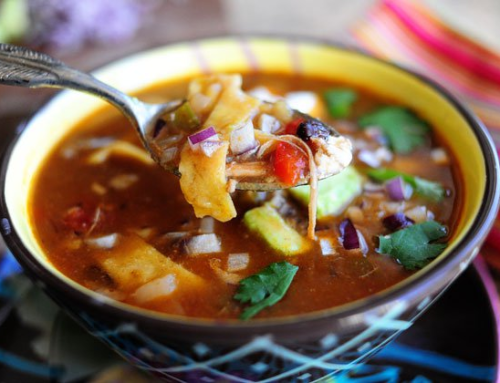Fat isn’t just a nutrient essential for your body, it’s also a key player in healthy cooking! The trouble is, between the mass of misinformation and misleading advertising, it seems almost impossible to determine which oils to choose as part of a healthy diet. Oils are used primarily for cooking, baking, and in salad dressings. With that in mind, there are 3 things to consider:
- What is the smoke point of the oil? The smoke point is the point at which an oil literally begins to smoke. Oils begin to break down at their smoke point, leading to the formation of potentially harmful compounds. To prevent this from occurring, heat your oil just until it shimmers, and make sure you choose the right oil for the type of cooking you are doing!
- What are the natural health benefits of the oil?
- What flavor will the oil impart to the food?
To simplify, let’s use a stoplight analogy to help determine which oils are best!
RED LIGHT— Stop and swap for a healthier choice!
- Partially Hyrogenated Oils [Vegetable Shortening & Margarines]: (Smoke Point: higher than 450o F)
Partially hydrogenated oils are carriers of trans fats. Even a small intake of trans fats has been associated with increased LDL cholesterol (the bad kind) and decreased HDL cholesterol levels (the good kind), as well as cardiovascular disease. Partially hydrogenated oils are used by food manufacturers to improve the texture, shelf life, and flavor stability of foods. Due to their high smoke point and high shelf life, many restaurants prefer to use partially hydrogenated oils for deep frying.
- Coconut Oil: (Smoke Point: ~350o F)
This offender has been masquerading as a “health food” recently, but the truth is coconut oil is considered a heavily saturated fat. It contains a large proportion of lauric acid, a saturated fat famous for increasing total blood cholesterol levels. Although lauric acid has been shown to increase HDL cholesterol (the good kind), it also increases LDL cholesterol (the bad kind). Despite coconut oil’s recent popularity, persistent consumption of coconut oil may drastically increase your risk of cardiovascular disease. Consume sparingly. Coconut oil adds a delicious coconut flavor to everything it touches. However, due to its relatively low smoke point, coconut oil is best used for baking and low-heat sautéing.
YELLOW LIGHT—Slow down- use sparingly!
- Butter: (Smoke Point: 300o F)
Butter is considered a saturated fat, and should be consumed sparingly to promote heart health. However, just 1 tablespoon of butter delivers 7% of the daily value for Vitamin A—nearly what you’d get in a cup of milk. And since we are comparing, butter contains significantly less saturated fat than coconut oil. Butter is delicious as a spread, and a favorite for baking because it provides moisture as well as fat. However, butter is not the best choice for sautéing due to its low smoke point. For pan-frying and sautéing, it is safest to use clarified butter (AKA ghee) because it has a higher smoke point.
- Vegetable Oil: (Smoke Point: Usually ~450o F)
“Vegetable Oil” is a general term that can include a combination of soybean and other oils, such as corn or sunflower. Vegetable oil, depending on the blend, can be a rich source of omega-6 fatty acids. Though vegetable oil is not pro-inflammatory, it does not necessarily provide any significant health benefits. Vegetable oil typically has a very mild flavor, but this depends on the blend. It is best used in baking and pan-frying. To increase the nutritional value of your cooking, consider switching to one of the GREEN LIGHT oils listed below.
GREEN LIGHT
- Extra-Virgin Olive Oil: (Smoke Point: 375o F)
Olive oil has an extremely high concentration of mono-unsaturated fatty acids, making it a powerful cholesterol-buster. Using olive oil in place of saturated fats has been shown to lower blood pressure, and lower the risk of heart disease and stroke. Olive oil has a fruitier flavor and aroma that most oils, making it great for salad dressings, drizzling, and moderate-heat sautéing.
- Avocado Oil: (Smoke Point: 482o F)
Apart from being a great source of Vitamin E, avocado oil is an extremely heart-healthy choice due to its high concentration of monounsaturated fatty acids. Avocado oil has a subtle avocado flavor, making it an excellent choice for salad dressings. However, it also has an especially high smoke point, making it the one of the best and healthiest choices for stir-frying, pan-frying, or sautéing.
- Canola Oil: (Smoke Point 486o F)
Canola oil has the smallest amounts of saturated fat and the most heart-healthy omega-3 fats of any of the common cooking oils. It is also a good source of vitamins E and K. Due to its light texture and neutral flavor, canola oil is very versatile and can be used in everything from baking to dressings. With its high smoke point, it is also perfect for sautéing, baking, and pan-frying.
Classic Hummus is a rich source of protein and healthy fats, and pairs splendidly with veggies or a whole grain pita. This smooth and creamy version beats anything you can buy at the grocery store!





Leave A Comment